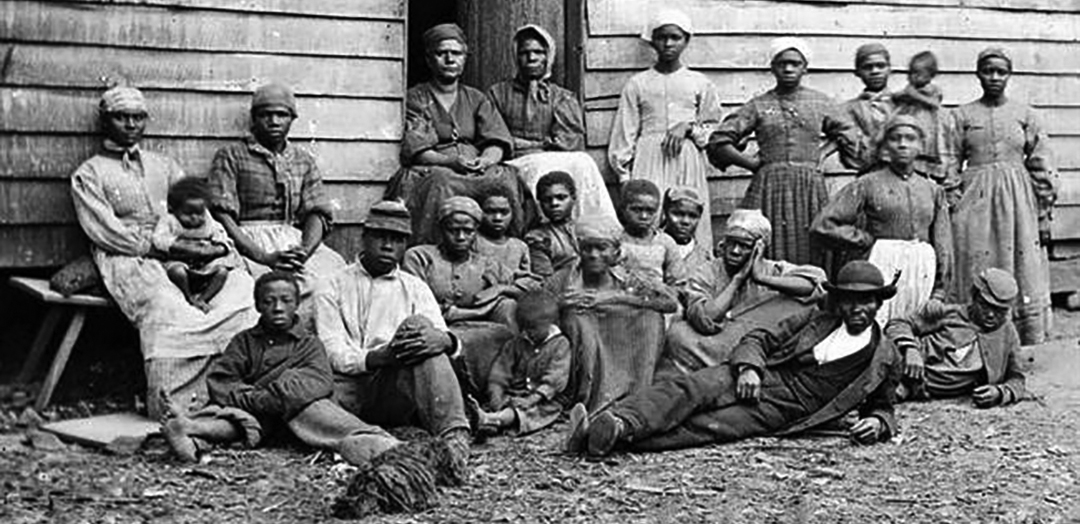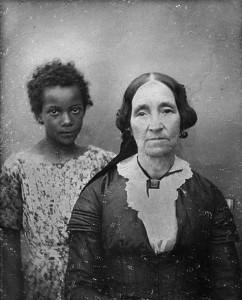They say absolute power corrupts absolutely. Well, no Duh. Please name a freedom or right taken to the absolute level that doesn’t corrupt. Absolute Freedom of Press would mean that people could print things that they know to be false with the sole intention of causing harm and not be held liable. Absolute Freedom of Religion would mean people could throw virgins into volcanoes every morning to get the Sun to rise.
The Institution of Slavery in the United States was capitalism in its purest most absolute form. So how was that a corruptive force?
The goal of business is to maximize profit while keeping costs at a minimum. As a slave-owner, your only cost, albeit substantial, was the initial investment of purchasing a slave. If you inherited your slaves after someone in your family died, you didn’t even have that cost. Regardless if you purchased your slaves or inherited them, one cost was unavoidable, and that was the cost of providing the bare necessities to keep that slave alive and strong enough to work. And believe me, the costs surrounding keeping slaves healthy and strong enough to work might’ve been unavoidable, but Slave-owners did their damnedest see if they could avoid it.
Katherine Stone noted that Planters, with a “sharp eye on the bottom line” gave most of their poorly sheltered, coarsely clothed, and poorly nourished human property “little hope of more than the bare necessities of life.”
One must ask, why? Why couldn’t the wealthiest men on the Earth at the time, afford to spend money to improve the quality of life of those who are literally responsible for generating their wealth? The answer is they could. If they wanted to. This is the first way the Institution of Slavery corrupted us, is that it fostered a culture where labor is devalued and wealth inequality is king.
Planters always responded fiercely to any suggestion of using free laborers instead of slaves, because as they would argue, “they (Free Laborers) simply could not be worked as hard or forced to submit to such treatment.” They feared that once free laborers saw how hard the work was that they would just “leave”. Another argument they often used was the possibility that a free laborer might organize a planned strike for a wage increase at a time of the season when the negligence of a crop, even for only a few days, could destroy the entire crop. Of this possibility, William Harper suggested, “What Planter would venture to carry on his operations under such circumstances? Without Slavery, the plantation system would simply collapse, reducing the southern elite to utter poverty and misery and spreading dissolution throughout the land.”
Wait. So those are our only options; pay someone absolutely NOTHING for their labor or suffer total societal collapse? Again, how about hiring free laborers and paying them a decent wage so that they wouldn’t just “leave”? What? You couldn’t afford it? If the wealthiest men on Earth couldn’t afford it, then who could?
These slave owners couldn’t care less about providing a “living wage”. Although it doesn’t surprise me, it always saddens me to recognize that there are people who already have wealth in abundance who think that providing a living wage to their workers, the people who are the real wealth generators, cripples their ability to make a profit.
It makes you question if you actually know what the word profit means. I did. So I looked it up just to make sure.
Profit: the monetary surplus left after deducting wages, rent, cost of raw materials, etc.
OK, I did know what it meant.
Profit is not a dirty word, don’t get me wrong. It’s a good thing, but keeping the workers in poverty or with no hope for more than the basic necessities of life for the sake of profit when you already have wealth is unconscionable.
What Planter would venture to carry on his operations under such circumstances? Without Slavery, the plantation system would simply collapse, reducing the southern elite to utter poverty and misery and spreading dissolution throughout the land.William HarperThere are lots of lessons that we can learn today from slavery. None more valuable than the Institution of Slavery stands as an example of what capitalism can devolve into when the ONLY care of business is the maximizing of profit. American Slavery showed us that greed is insatiable, and if maximizing profit is the sole focus, human rights abuses are unpreventable.
The next big lesson we should learn from American Slavery is how absolute capitalism gave life to Aristocracy. Democracy is when political powers are held by the people. Aristocracy is when power is held by a privileged upper class. Democracy and Aristocracy are two incompatible ideas. Instead of viewing Aristocracy for what it is, anti-democratic, many of us just close our eyes and pray that one day, through hard work and a little luck we can too become a part of it.
Anyone who values democracy has an obligation to stand vigilant against political power being consolidated in the hands of a privileged upper class, regardless of how that privileged upper class manifests itself. Today we have protections in place to guard against a privileged upper class if that upper class is defined by race, but what if that upper class is defined by wealth? What protections do we have in place for that? This is the reason, more than any other, that history repeats itself. Too many people think if you change the key, you’re playing a different song. In the interest of democracy, we should all be exercising our right to vote by this simple rule, hold any and all politicians accountable if they pass any law that benefits the interest of the FEW at the expense of the MANY. It’s that simple.
It was because of the Institution of Slavery that when the United States Constitution was formed it was fundamentally flawed. It was flawed because the founding fathers tried to do the impossible, to form a government that tried to find a balance between the interests of Democracy on one hand, and the interests of Aristocracy on the other. The most obvious example of this can be seen in the legislative branch. Here, the democratically leaning founding fathers came up with the House of Representatives, where population dictated how many representatives you would have to represent the interests of where you lived.
This was unacceptable to the Slave-owner Aristocracy because the overwhelming majority of the population in the South were enslaved Africans who could not vote. If this was how legislation was going be written and then forwarded on to the President to sign into law in this young country then the Aristocracy will be quite at the mercy and the will of the people…
Well #$%^ that.
As a compromise, the Aristocracy of the South were allowed to count slaves as 3/5th a person. The Senate was created so that each State could send two Senators to represent their interests in government regardless of population. In addition, both houses of the legislature were required to work together so that one couldn’t pass legislation on to the President to sign without cooperating with one another. This effectively gave the Aristocracy in the South the ability to play obstructionists, if need be, to protect their economic interests if democracy ever tried to do something stupid like an act in the interests of the people.
This gave wealthy Southern Planters a disproportionate amount of representation in government as they were able to both count people as residents who, in fact, were nothing more than things, and secondly they had just as many representatives in a Senate that didn’t take population into account at all. But that still wasn’t enough for them to sleep well at night. On top of that, these Southern Planters did all that they could to make sure that Government be kept small and weak so that Democracy wouldn’t have any real ability to tell the Aristocracy in the South what to do, especially when it concerned how they treated their slaves, their wealth generators.
They weren’t getting over on anybody. People could see what they were doing. It’s just that they held so much power, that although you could see what was going on, if you weren’t part of that elite class there was little you could do about it short of standing there and watching. Why do you think when the Civil War broke out there was so little support for the war among poor whites?!! It was because the institution of slavery, pure capitalism in action, did nothing to benefit them. Slavery only benefitted a very small but immensely wealthy few. Many poor whites in the Antebellum South, strictly from a housing, nutrition perspective lived in appalling conditions, comparable, if not worse than some enslaved Africans.
So whenever I hear any politician talking about how society would be better with small, weak government, I immediately think of Southern Planters wanting a government that was unable to tell them how they could or couldn’t exploit their labor. Whenever I hear that the cost of labor is holding back economic growth, I immediately think of how the wealthiest men on the Earth thought that paying free laborers to work their fields would somehow cause their society to collapse, reducing them to utter poverty and misery and spreading decay throughout the land.
And that is when I throw up a little in my mouth.


